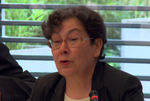MS. FLOUR:
contribution 2 -
FLOUR Yvonne

transtlated version
Thank you.
Your Excellencies, Ladies and Gentlemen, it is on behalf of the University of Paris I that I have the great honour to welcome you to this hall today and for the symposium that brings us here.
First of all, Paris I, because the institute for economic and social studies, which is one of the main organisers of this Conference is a test of our university, and we have made our best to work for this seminar. We are happy to see that it is taking place today — Geneva is slightly far from Paris I — in this beautiful city where the traveller has this great impression of calm. And things that may appear improbable are quite possible here, and for that we need to thank the Academy, the General Academy which is welcoming us here today.
I would like to thank the organisers for the great job they have done, as well as the participants, and all the stakeholders to this symposium, because we must underscore before we move on the originality and the challenging nature of our work here.
The symposium is a university activity, and we know what we are doing. But the dispensation, what we are doing here today, is slightly different. The idea is not to use international justice and transform it into some science or speechmaking experiment. But it is an experience that we all have experienced and hope to share in various ways.
We know that each of us and each of you are committed to this experience that will try to detail in our various personal experiences. So we need to discuss a lot of your needs, and we need to discuss it with broad mindedness. And I really thank you for coming to narrate this experience with us, which really has no precedence.
So it is with keen interest that we look at the discourse, the juridical discourse in this area.
I would not like to hold fort too much, but I will just say that the title of this symposium raises a number of questions. "Model or Counter‑Model of International Justice." Is there a model in the area of justice not to speak of international justice? That would entail comparing the various systems and the various countries to see whether there is not just one model but several models. But I believe that each system has its own models, and justice ensures the impartiality of the Judge and the ideal of justice itself.
So within each system, the international justice system has to work out, chart its own course, without necessarily relying on one or another model, but building its own model. That is what has been done for sometime. This symposium, through your activities, offer us that opportunity to revisit our experiences and try to provide a number of solutions to the questions raised.
So I would not dwell overly on this issue that focuses our attention for several days. It is not the time to delve into the heart of the matter. So I will hand over the floor.
PROFESSOR BURRIN:
Before handing over the floor to Mr. Dahinden, I would like to point out that Prosecutor Jallow will be joining us slightly later.
I would like to take advantage of the change of speaker to express that acknowledgement to the two institutions that are sponsoring, co‑sponsoring this symposium, that have made it possible, that is, the Federal Department of Foreign Affairs of Switzerland and, particularly, the development and cooperation department represented by Ambassador Dahinden and the International Criminal Tribunal for Rwanda represented by Judge Byron.
I will now give the floor to Ambassador Dahinden.

